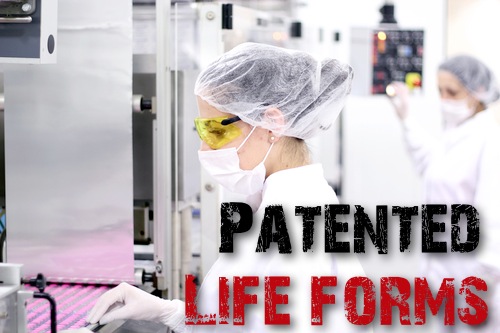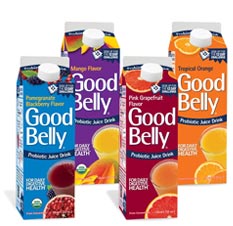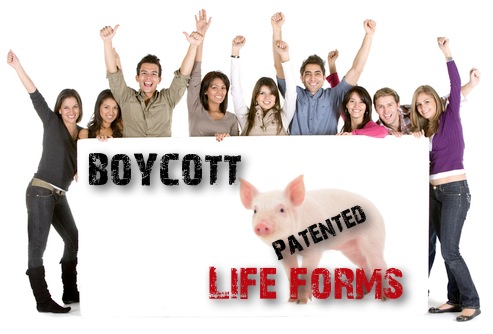
The Consumer Defense Resource Group has issued a strong consumer advisory regarding the use of patented life forms. Consumers are urged to avoid using patented lifeforms.
Monsanto has been the most visible global corporation to patent transient self-replicating life forms and then engage in lawsuits with everyone in their path. The Wikipedia page on Monsanto is 28 pages of single spaced text describing numerous world-wide grievances. The Monsanto Pig Patent documentary video and The World According to Monsanto documentary video cover these issues extensively.
 NextFoods is one of the most recent companies to engage in patenting lifeforms through their probiotic juice and other products under the Good Belly brand name.
NextFoods is one of the most recent companies to engage in patenting lifeforms through their probiotic juice and other products under the Good Belly brand name.
Like Monsanto’s pig patent, NextFoods has taken a naturally occurring life form (a species of Lactobacillus) and claimed patent rights to it.
As if to incriminate themselves, the following statement is provided on their website:
Lactobacillus plantarum 299v has been naturally occurring in the gastrointestinal tract of animals and humans, plant material and as a result of food preservation processes across cultures, since as far back as history allows us to study. [source: NextFoods]
As a result of their patent, NextFoods owns patent rights to the bacteria that is likely inside your body, as well as many animals and plants.
“Lactobacillus plantarum is a widespread member of the genus Lactobacillus, commonly found in many fermented food products as well as anaerobic plant matter. It is also present in saliva (from which it was first isolated). It has the ability to liquefy gelatin.[1] L. plantarum has one of the largest genomes known among the lactic acid bacteria and is a very flexible and versatile species.” [source: Wikipedia]
At present, NextFoods is quietly expanding their market and the Good Belly brand is a well marketed feel-good brand that is not likely to meet with any resistance. It’s unlikely they would engage in any legal battles early on because it could result in a legal challenge against their patent/ownership of a species that is naturally occurring.
NextFoods philosophy is founded upon Environmental Stewardship, Sustainable Farming Practices, Social Responsibility. At present, it seems that NextFoods is the antithesis of companies like Monsanto. However, if the company principles (ethics) were to change, or if the company principals (owners) were to change, there is nothing preventing their life form patent from turning into a legal nightmare.
Everyone has their price. Assume for a moment that NextFoods gets purchased by Monsanto. What would Monsanto do if they owned the patent to Lactobacillus plantarum 299v? They would probably initiate lawsuits against every yogurt manufacturer in the world, and then charge every human being a fee for the use of the patented bacteria naturally occurring in the body.
Allowing patents for lifeforms is problematic, even when good companies are in control, there is potential for unfair market practices and monopoly control over what is essentially a naturally occurring life form.

Further Reading. For those wishing to learn more, the following resources and information are provided.
The patent for Lactobacillus plantarum 299v originated with ProViva, a company based in Sweden. One report about the early research of Lactobacillus plantarum 299v provides this information:
Lactobacillus plantarum 299v, aka “Lp299v”, was identified in a study done at Lund University on the taxonomy of lactobacilli in the GI tract. The authors of that study then published a novel experiment that identified implantable strains of lactobacilli. Instead of testing in a lab, they tested 19 strains in vivo. Subjects ingested a variety of strains, and later biopsies of their intestinal mucosa were examined to determine which had successfully implanted1. Five of the strains persisted at least one day after administration, with Lp299v being the most dominant.
Lp299v (also known as DSM 9843), along with Lactobacillus rhamnosus 271 (DSM 6594), were patented in the USA in 1995 by the Swedish firm Probi AB (Patent number 5,474,932). The inventors were Stig Bengmark, Siv Ahrné, Göran Molin, and Bengt Jeppson, all of Sweden (most work for Probi AB). This company owns the rights to the strain, which they sell in a fresh juice product throughout Europe called “ProViva”. Numerous studies have been conducted on the health benefits of Lp299v; in many it was administered in the form of ProViva. [source]